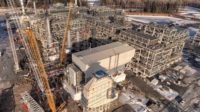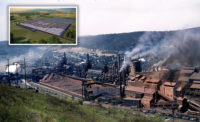While the firm builds mostly for the military, its work also includes embassies in Kabul and Kyrgyzstan and other classified work, says Vohra. ECC has bypassed projects on which corruption, foreign exchange, logistics and other risks are too high. "We do our homework in markets we don't know," he says.
To boost technology innovation and best practices, ECC has design-build centers of excellence in San Antonio and Virginia Beach, Va. It recently installed a $4-million solar wall on a Defense Logistics Agency facility in Pennsylvania that is the largest such installation in the U.S. on a single building and is expected to save more than $300,000 annually in operating costs, the firm says. It also has developed innovative robotics technology for use in munitions cleanup and range clearance.
According to Vohra, ECC has been "consistently profitable since 1990"—except in 2011, when economic and project issues caused a loss. "But we made a strong comeback in 2012, and [the firm] was profitable," he says.
Staying 'Right-Sized'
The turndown in federal markets, spurred by sequestration, and more recently, the government shutdown, has left Vohra uncertain about 2013's financial outcome, but the firm began turning to other clients—for example, multinational development banks and alternative energy work for local utilities such as Hawaiian Electric Co.—more than three years ago. About 18% of its revenue will be in such "adjacent markets" this year, but Vohra wants that to expand beyond 50% by 2015.
For now, while ECC is coping with the shutdown, Sweatt says it "has left some of our client personnel concerned, worried, even demotivated." He also notes the rising costs of doing government business but concedes that current conditions may limit competition.
Vohra says furloughing of contract overseers and project managers is slowing routine invoice and change-order processing, which "puts a huge financial burden on contractors." He says the firm's project work is funded, so no layoffs have occurred as of CBQ press time on Oct. 14.
Sweatt points to the future challenge of "staying right-sized in the face of declining federal budgets." Vohra adds that the "dysfunction of Congress ... is not good for the federal market in the long term."
For now, ECC prides itself on the strength of its culture and workforce esprit de corps that has earned it three consecutive "best place to work" listings among Bay Area firms and a nod as "healthiest employer" from a Hawaii business magazine. The firm's wellness program features a "personal health coach" and 24-hour "nurse line."
Even as ECC's non-descript corporate headquarters exemplifies its low-key image, seeing Vohra on jobsites is somewhat more illuminating. He is a practicing Sikh.
"Sikhism's philosophy of service to others is very similar to our firm's philosophy of servant leadership," he says. "We teach and reinforce this philosophy in our leadership development program, which was started in 2005 and is led by two faculty from the University of Denver."
CFO Tom Del Mastro, who joined the firm two years ago from a similar role at a Tetra Tech unit, says that, during his interview, "there was a common theme among all the people that I spoke with, including all the folks that I met informally in the office, that they all loved working for ECC. It was very refreshing for me to hear."
He touts company leadership that "allows employees to focus on long-term client relationships and doesn't waver due to short-term obstacles. Employees clearly understand and are committed to ECC's vision of being a trusted partner and a great place to work."
Vohra says the firm's ESOP ownership still "gives us some cachet among the right people. We can attract people in for the long term."









Post a comment to this article
Report Abusive Comment